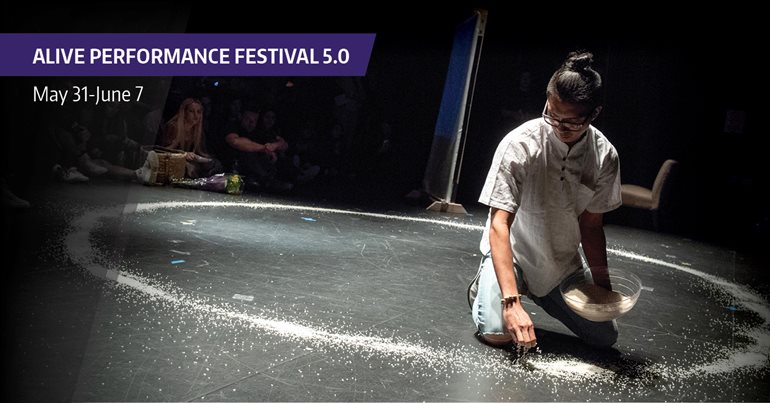
When most people think of performance, they think of dance recitals, plays or concerts. But according to Anida Yoeu Ali, a professor and senior artist-in-residence at the University of Washington Bothell, performance is something anyone can do, at anytime, anywhere.
“Everything can be a stage, and any place can be a gallery,” Ali said. “It’s just a switch in your thinking.”
She explained that often people don’t have access to spaces where performances are expected, such as theaters or galleries. “Because of the cost, the time or the culture that surrounds the experience, many people from varying socioeconomic means don’t have access to those spaces,” Ali said. “So I firmly believe in taking the performance to the people.”
Dr. Naomi Macalalad Bragin, assistant professor also in the School of Interdisciplinary Arts & Sciences, further explains, “Our approach to performance works with the limitations that exist so that students learn to be expansive in their thinking and stretch their possibilities.”
And, through the Alive Festival, students learn how they, too, can expand their thinking and turn everyday spaces into performance-worthy stages.
Language in action
Every spring since 2018, faculty from UW Bothell’s Critical Acts research group come together to host the festival that showcases original student performances, research projects and even works-in-progress that are presented in ordinary spaces such as classrooms and outdoor campus areas. Ali and Bragin are two of the faculty members leading the event.
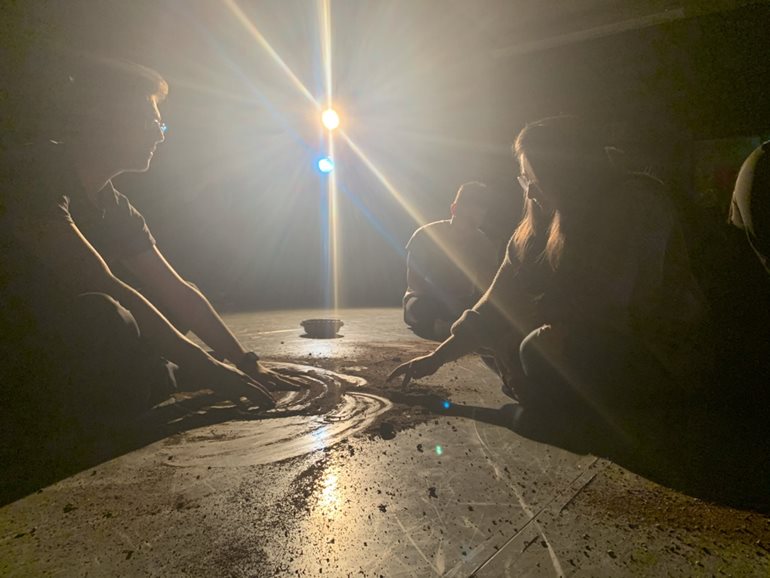
“The Alive Festival is the pinnacle of all the work that students have been doing this quarter, and it’s definitely a showcase of all that they learned,” said Sam Prudente, 2018 alumnus and former participant. “As members of the UW Bothell community, I encourage everyone to take a moment from our end-of-quarter worries to witness and listen to our communal wisdom.
“A lot of things that we learn cannot or do not make it into papers,” he said. “Sometimes they have to be performed, behaved or shown as examples.”
Creating time and space for performance is a powerful way to engage people. “Performance as a language is what the Alive Festival provides a platform for,” Prudente said. “It will be an enriching experience, and the long absence of live performance due to the pandemic makes the festival so much more special because it could be the first time students are performing in years.”
Shame cannot exist in light
At UW Bothell, students are encouraged to create works that embody a cause that matters deeply to them. When Prudente performed in 2018, he used it as an opportunity to share what was once his “deep, dark secret.”
He explained that, through the festival, he was able to take that secret and turn it into a powerful message about living authentically. “I am now openly gay, but for many years this was a truth I kept hidden. It was my deep, dark secret,” he said. “Before coming out, my entire life was, in a sense, a performance. I was putting on an act, pretending to be someone I wasn’t.
“Being able to pull back the curtain and live my truth has been incredibly empowering.”
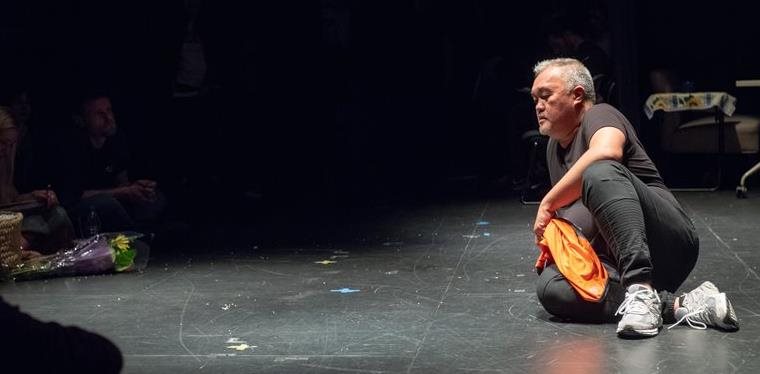
His performance at the festival was a monologue, and he recounted the moment he came out to his best friends during his first year of college. “It was an afternoon. The sun was just beginning to set. We had walked around trying to find an open basketball court, but all were taken,” he fondly reflected. “So we sat on some steps, and I just said, ‘Hey, I am so comfortable with you guys, and there is something I want to tell you …’”
Because coming out is a process of not just knowing oneself but also knowing one’s listeners, Prudente decided to engage with the festival audience to mirror that kind of connection. “I asked the audience to look to the person to their left and look to the person to their right,” he said. “I reminded them that these are people, people with stories that deserve to be told and to be listened to. I reminded them to create and hold that space for one another as they go about their lives.”
Prudente is now a graduate student at UW Bothell pursuing a Master of Arts in Cultural Studies and strives to use theater to empower individuals. “Through performance, you meet your true, authentic self,” he said. “You come clean with yourself, and you need to be prepared to meet your own truth. You learn who you are and what you are capable of.”
From science to art
Performances also made a deep impact on 2022 alumnus Kohl Dydhal. Before enrolling in Ali’s Performing Diaspora class and participating in the festival in 2019, he didn’t have much experience in performing arts. In fact, when he signed up, he didn’t realize it was a dance class. “I remember seeing the room number was the dance studio, and I thought, huh, that’s weird,” he said.
“Then, at the start of class, professor Ali asked us to perform how we were feeling. She said, ‘If you’re angry, show me you’re angry,’ and then she jumped up and started pounding on the floor — that was when I realized what I had gotten myself into.”
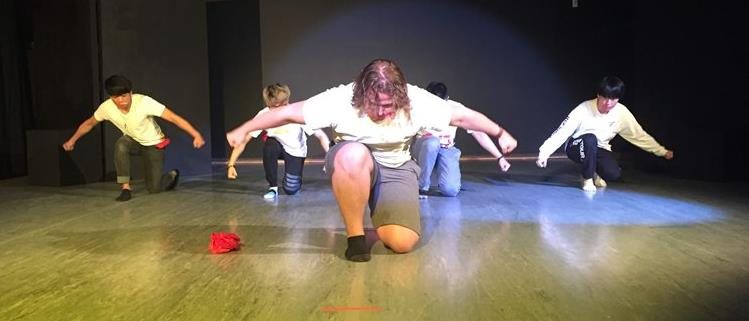
While the activity was outside of Dydhal’s comfort zone, he decided to stick with it, and it turned out to be his favorite class. “Doing interpretative performances makes you extremely vulnerable,” he said. “Society thinks of it as silly or even cringey. So doing it anyways and being vulnerable trains you for times in your life when you have to be vulnerable and are in a high-stakes situation like a job interview.
“When you are applying for a job and stressed out, you are in a vulnerable position, but you can call back to those times when you were vulnerable,” Dydhal said, “and know that you can and will get through it. It’s confidence through experience.”
Across disciplines
Now working in UW Bothell Information Technology, Dydhal regularly calls on his performing arts skills. “People often come in stressed and can be a bit disrespectful,” he said. “I use the confidence and control I gained in the classes to keep my professionalism. The things you learn in arts carry across disciplines.”
Expanding on Dydhal’s insight, Bragin explained that performance requires critical thinking, collaboration and communication — the building blocks for successful relationships and careers. “Performance helps students not only succeed in class but also in life.”
Adda Lee, senior in the School of IAS and former Alive Festival participant, noted that “the performing arts have helped me improve in so many different aspects of my life.”
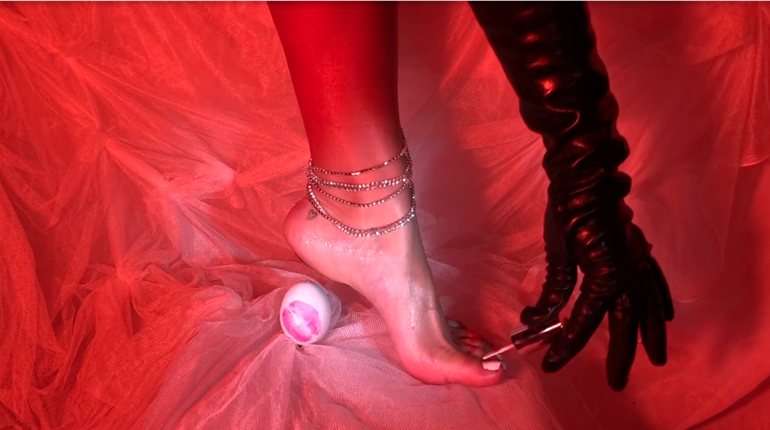
Lee said she has even applied skills she gained in the arts to her science-based classes. “I took a data-visualization class, and for the final I had to record a video of myself presenting my work,” she said. “Because of what I had learned in performance, I had all of this knowledge about lighting, the background, if I was speaking clearly, what good camera angles were — all of these things were so helpful, even in a STEM class.”
Perhaps more importantly, she said, because of the performing arts she learned more about herself, and in the process, gained confidence. “I have become more self-aware,” she said. “I have figured out what I am good at and where I can continue to grow. That knowledge and awareness is everything.
“As I prepare to graduate and leave college,” Lee said, “I will be taking with me all that I learned through performance.”
Celebrating people
For Prudente, the festival also holds a deep resonance. “Before I accepted myself and came out as gay, I was blocking myself off from pursuing my passion. I dreamed of going to college and starting a career in performance, but as an immigrant and at odds with my sexuality, I thought it was impossible,” he said.
“I was living only half a life. This is the Alive Festival. For me, it was a celebration of finally coming alive, living fully. It was one of the most powerful experiences I have had in my educational journey, and I highly encourage people to participate in it in the years to come.”
Prudente invites everyone in the campus community to attend, even if they don’t have a friend who is performing. “If we are invested in allyship and social change, let’s listen to what other people are considering important to work on so that we come away with our own learnings,” he said. “The festival is a chance for people to share themselves and their truths with the community. To have an impact, we need there to be people to watch, listen and engage.”
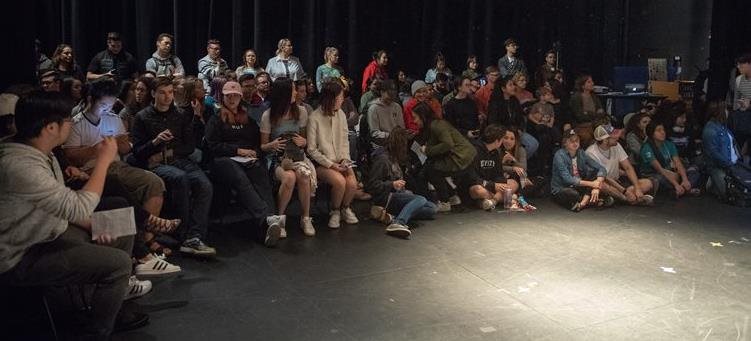
The Alive Festival, which features students from nine classes, will take place May 31 to June 7 in a variety of locations and times.



